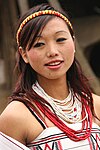Rongmei people
[1] They share similarity with their kindred tribes of Zeme, Liangmai and Inpui, which together are known as Zeliangrong.Some historians and anthropologists have earlier recorded them as Kabui along with Inpui people.It follows the lunar calendar and is celebrated on the 13th day of the Wakching or Gaan Ngai buh.It is celebrated to worship the Supreme God Haipou Tingkao Ragwang.[2] During the Colonial period, under the leadership of Haipou Jadonang[3] and his successor Rani Gaidinliu,[4] the Rongmeis along with other Zeliangrong tribes rebelled against British rule in the 1930s.
Naga woman
Kabui (surname)Northeast IndiaRongmei languageChristianityTingkao Ragwang ChapriakHerakaLiangmaiNorth-East IndiaConstitution of IndiaZeliangronganthropologistsInpui peopleGaan-NgaiHaipou JadonangRani GaidinliuHill tribes of Northeast IndiaTamenglongList of Naga tribesMinistry of Law and Justice (India)AngamiChakhesangChotheKharamKhiamniunganKonyakLainongLamkangMakuryMaringMonsangPochuryPoumaiRengmaSangtamTangkhulTangsaThangalTikhirWanchoYimkhiungMizoramChakmaDimasa (Kachari)HajongKhasi and JaintiaSynteng or PnarLyngngamKuki TribesMan (Tai speaking)Mizo (Lushai) tribesMikir (Karbi)Naga tribesPawi (Lai)Synteng (Pnar)YimkhiungNagaNagalandBodo-KachariMeghalayaKhasi Synteng or PnarLakher (Mara)Arunachal PradeshAbor (Galo)Aka (Hruso)ApataniDafla (Nyishi)GalongKhowa (Bugun)MishmiMiju MishmiChugpaLishipaSherdukpenSingpho (Jingpo)Tai peoplesKhamptiKhamyangKhambaMinyongMishing (Miri)PuroikZekhringManipurGangteKoirao (Thangal)KoirengSuhte (Paite)ThadouVaipheiTripuraBhutiaJamatiaKhasiaLepchaLushai (Mizo)Munda, KaurNoatiaSantalTripuriSikkimSherpaTibetanHrangkhwal, RangkholKhelmaSairhem TangsaList of Scheduled Tribes in India